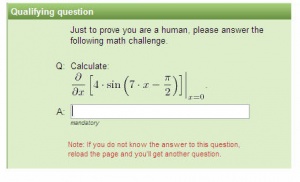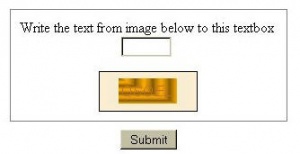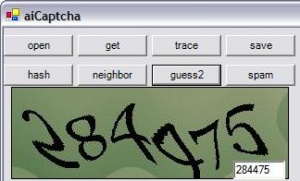CAPTCHA
From Computing and Software Wiki
CAPTCHA is an acronym for Completely Automated Public Turing Test to Tell Computers and Humans Apart. Commonly, these tests take the form of images of scrambled text that a human is able to read, but current optical character recognition software cannot decipher. The most common use of a CAPTCHA is to protect web-accessible services from being abused by "bots".
Contents |
Background
Weaknesses
Poorly Made CAPTCHA
A CAPTCHA can be described as poor in one of two ways. Either the test fails to be human-solvable in a reasonable amount of time, or it can be solved by a computer using current AI techniques.
To the right are two CAPTCHA that fall under the first category. The first image displays a CAPTCHA that requires the user to solve a difficult calculus problem in order to proceed. While this may successfully thwart a bot, it also prevents many legitimate users from using the web service. Likewise, the second example CAPTCHA is simple unreadable by humans due to poor contrast.
Accessibility
References
- Carnegie Mellon University. 2009. What is a CAPTCHA?.
- Chesnut, Casey. 2005. Using AI to beat CAPTCHA and post comment spam
- Luis von Ahn, Ben Maurer, Colin McMillen, David Abraham and Manuel Blum. 2008. reCAPTCHA: Human-Based Character Recognition via Web Security Measures. In Science.
- Luis von Ahn, Manuel Blum, Nicholas Hopper, and John Langford. CAPTCHA: Using Hard AI Problems for Security. In Eurocrypt.
- Luis von Ahn, Manuel Blum and John Langford. 2004. Telling Humans and Computers Apart Automatically. In Communications of the ACM.
- W3C. 2005. Inaccessibility of CAPTCHA.
- Willis, John M. 2008. Top 10 Worst Captchas.



